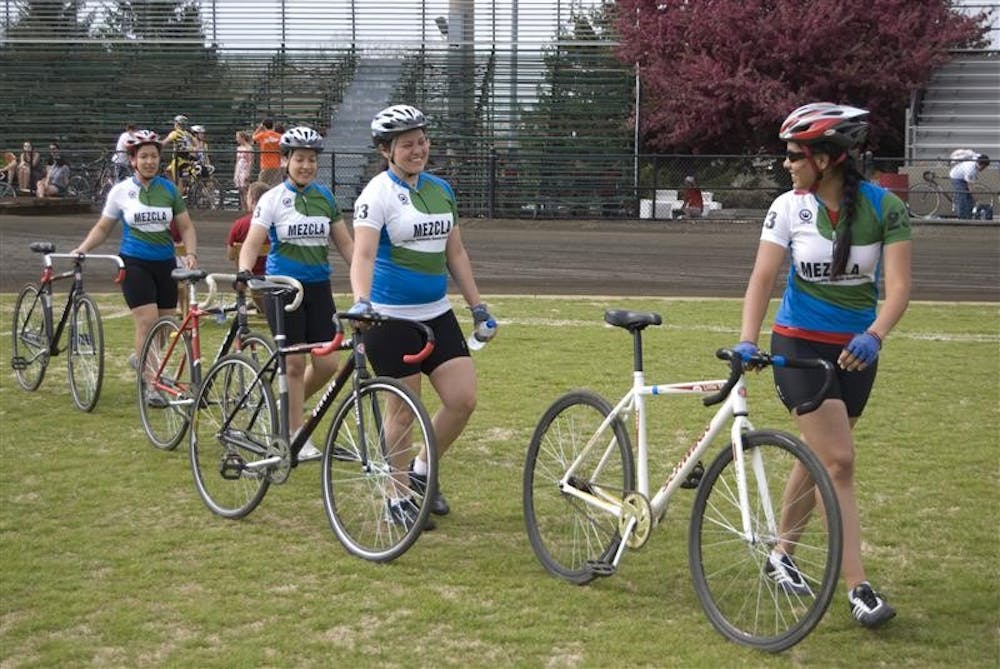The fact is simple: White teams dominate the men’s and women’s Little 500 fields.
With an IU tradition on a predominately white campus that features a stereotypical white sport, it is little surprise the Black Student Union for many years held a picnic at the same time as the men’s race.
But this year, two women’s teams – first-year, all-black Lioness Cycling and the Latino-based Mezcla Cycling – are starting to break down this invisible divide.
On the men’s side, Team Major Taylor’s roster consists of white, Latino and black riders.
For Lioness Cycling, several race members were inspired by IU political science professor Lawrence Hanks and his African-American Politics class.
Senior Maeza Yalew said Hanks’ message of action led her to create the team.
“Whatever things we believed needed to be changed, we should go after that instead of complaining about those things,” Yalew said.
And things do need changing, she said. Or at least some improving.
This year, only three teams have a clear purpose of diversifying the race – the two women’s teams and men’s entrant Team Major Taylor. Almost all of the other greek and independent teams are entirely white.
In his 15 years at IU, Hanks, the faculty adviser for race-awareness group ONE IU, said the Little 500 struggles to create a diverse field.
“The Little 500, for all practical purposes, is something that students of color – and especially African-American students – just saw as a white event,” Hanks said. “In many ways, some of that has been broken down, but to be perfectly honest, you still have some of that.”
For non-white students, the Little 500 can have little appeal.
“We never really had the desire to come to the race,” Yalew said, “because we didn’t have anybody that identified themselves with us.”
Hanks said people just enjoy their comfort zones, and despite an open campus where students can participate in any event, the Little 500 does not feel natural for black students.
“Most people are very open, most people want to be inclusive, most people want to be involved in a diverse world,” Hanks said. “Yet we keep seeing these manifestations of things that are IU just showing up overwhelmingly white – and sometimes all-white. Why go to Little Five when nobody you care about is participating?”
The simple race demographics at the Bloomington campus reflect the difficult efforts for black students wanting to participate. According to the 2008-2009 IU Fact Book, only 4.3 percent of IU students are black, while 88.9 percent are listed as white or unclassified.
The minority status did not deter Yalew and her teammates.
By utilizing a grassroots fundraising effort that included selling puppy chow and cookies outside Ballantine Hall last semester, Lioness Cycling began operating on a small budget. With support from the Neal-Marshall Black Culture Center and other organizations, the team’s goals came to fruition March 28 when it qualified for the women’s race. Their qualification position? Last place – the 31st team in the field. But the fact they needed a fourth qualifying attempt to make the race is not the team’s central concern.
Their qualification position? Last place – the 31st team in the field. But the fact they needed a fourth qualifying attempt to make the race is not the team’s central concern.
“Our motivation is to eventually be a top-10 team,” Yalew said. “But then, we also want to have people in the stands that are like us.”
There have been several previous attempts to diversify the race. Team Marshall, an all-black women’s team, competed in the race in 2005, and Team Major Taylor became one of the most successful men’s teams with five top-10 finishes since 2002.
The Asian Culture Center also fielded a men’s team this year, but failed to qualify. The team placed 37th, falling 10 seconds short of the last qualifying time.
The IU Student Foundation also reaches out to the many cultural organizations on campus. The Little 500 Riders Council, consisting of several veteran riders, has a committee focused on creating diverse teams.
Senior Riders’ Council member Clayton Feldman, a member of Cutters, said the committee contacts “any and all groups on campus that might be interested in participating in the Little 500.”
One of the longest-tenured teams featuring diverse riders is Mezcla, which was founded in 1995. Mezcla operates with the slogan, “Si, se puede,” which means “Yes, you can” in Spanish. This year, Mezcla, Spanish for “mixture,” fielded only a women’s team, which qualified 23rd.
Freshman Sandra Salcedo said it makes her feel important to represent the entire Latino community.
“We have so much more riding on us and for us than just a house or a name or three letters,” Salcedo said.
Hanks said these diverse teams are integral to the success of the Little 500.
“Maybe 100 years from now, people will look back at this and say, ‘Oh, how quaint – isn’t it weird this is the way it used to be?’”
In face of sameness, 3 teams add diversity

Get stories like this in your inbox
Subscribe




